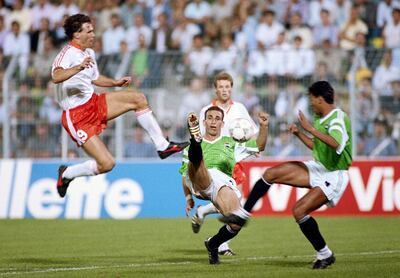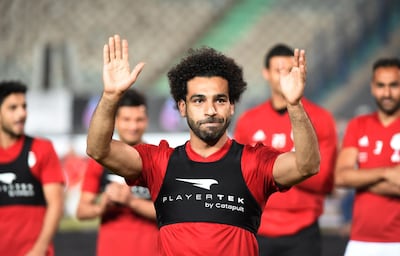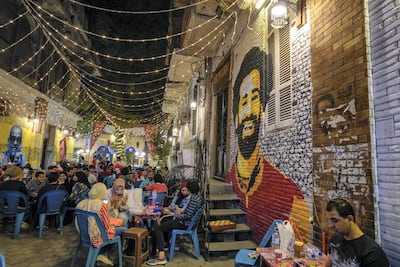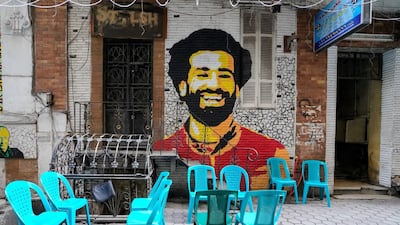The last time Egypt were in the World Cup finals, in 1990, Moaz was five years old.
"Gohary... Gohary," he recalls chanting from the balcony of his family's home in Cairo, as national team coach Mahmoud El-Gohary's side secured a late draw against the Netherlands, a team imbued with the might of Ruud Gullit and Marco Van Basten.
Moaz, now a German-based physician, is back in Cairo for Eid, sitting on the same balcony with his father.
The challenge, however – getting a signal for state-owned channels so the family can watch World Cup games together – is not one they anticipated.
Moaz and millions more are eagerly anticipating Egypt's World Cup opener against Uruguay.
The problem is the cost.
Qatar-based beIN Sports controls the World Cup television rights. With a subscription coming in at above $200, people are looking for cheaper alternatives.

Haythim, not his real name, is illegally providing access by extending cables to different houses in Giza, a neighbourhood of the capital best known for being home to the Pyramids, at around a quarter of the legitimate price. "I am in the satellite business, but I believe football should be shown for free. It is one of the few things that make people cheer up," he told The National as he set off to install signal boosters at people's homes.
_____________
Read more:
Egypt demands FIFA give state TV World Cup rights
World Cup 2018 live blog Day 1: hosts Russia take on Saudi Arabia
TV vendors, tourism and fast-food outlets to get World Cup boost
_____________
Abdel Azzim, 37, is a regular at local cafes, enjoying the camaraderie as he puffs his Shisha pipe and sips coffee.
"I will watch the games in the cafe, and for the first time I will allow my two sons to join me. I might even take my wife and little daughter if I find a decent place."
Cafes are looking to cash in.
Saeed, a waiter in Cairo's Ain-Shams neighborhood, explained that entry during games will be 20 Egyptian Pounds –– about the price of three local beers.
"Our place is a small one but we will spread the chairs outside and most probably pay off the owner of the grocery shop near us to give us some space," he said. "The cafe owner cancelled all vacations this Eid as we will need more labour. The World Cup is going to be a season."
Illegal television access can also be shared, via electronic signal splitters.
One of those sharing is Hossam, a retired philosophy teacher. "I remember in the 1990s, football was free. Now it is expensive, but it is a passion we cannot give up."
An explanation of that passion this summer is Liverpool striker Mohamed Salah, who has become Egypt's de facto goodwill ambassador. His recent injury in the Champions League Final means he is likely to be on the bench at best.

Aside from being plastered on banner advertisements across Egypt – murals in small cafes to well-crafted marketing campaigns – and on television, Salah's story from young minor league footballer to the English Premier League has inspired a nation.
"If Salah can do it, I can do it," said Mohamed Samir, a 19-year-old who plays on a sandy pitch next to a youth centre in Cairo's working class Mataryia neighborhood, noting that the Liverpool striker's success has "no corruption or nepotism, but only his talent and training."
Tourism companies estimate that 10,000 Egyptians will travel to Russia for the tournament.
"I have been waiting for this for years and have been through many heart breaks so to sum it up I'm over the moon and very proud I will be there," said Mahmoud, 29, a Washington-based journalist, who is cutting short his annual Eid vacation to travel to Moscow.
"My family here are a bit annoyed that I'm leaving them early but they kind of understand. I want to drink it in, every bit of this experience."
Mahmoud is one of many Egyptians who thought Salah, a player who had a short stretch at Chelsea before being loaned to Fiorentina and transferred to Roma before returning to England, would not go as far in his career as he has.

At Liverpool, however he has "proven over and over again that the sheer belief in your dreams can drive you right there", said Mahmoud.
"I'm very proud of him and I hope he can achieve more and more. He's a national hero whom people can rally around."
Egypt's first match will mark the first day of Eid, and will start at 2pm local time, one hour after the end of the weekly Friday sermon and prayers.
Amin Gomaa, a cleric who oversees preaching at a mosque in Helwan told The National he will try to make this week's sermon as short as possible. "If I don't, people will quietly withdraw from the mosque," he said, laughing at the prospect. "I have never been a fan of football or cafes. But I think this is a good chance for the nation to unite after one goal."
The sense of unity has been encouraged on a national level.
Amgad, 21, a university graduate doing his military service told The National he and his comrades in the zone where he is standing guard have small radios so they can listen to match commentary.
"Our commanding officer is very rough, but he loves football, so he might let this pass."
Others feel similarly.
"I still can't believe that the national team made it. I was still a kid and didn't fully understand what was going on, but now I can totally relate to the whole atmosphere of pride," said Moaz, looking back at the 1990 finals in Italy where Egypt crashed out in the first round.
Once again, leaning over the family balcony to move the television antenna to seek a better picture, his father yelled: "The sound is good but there is still no picture."

